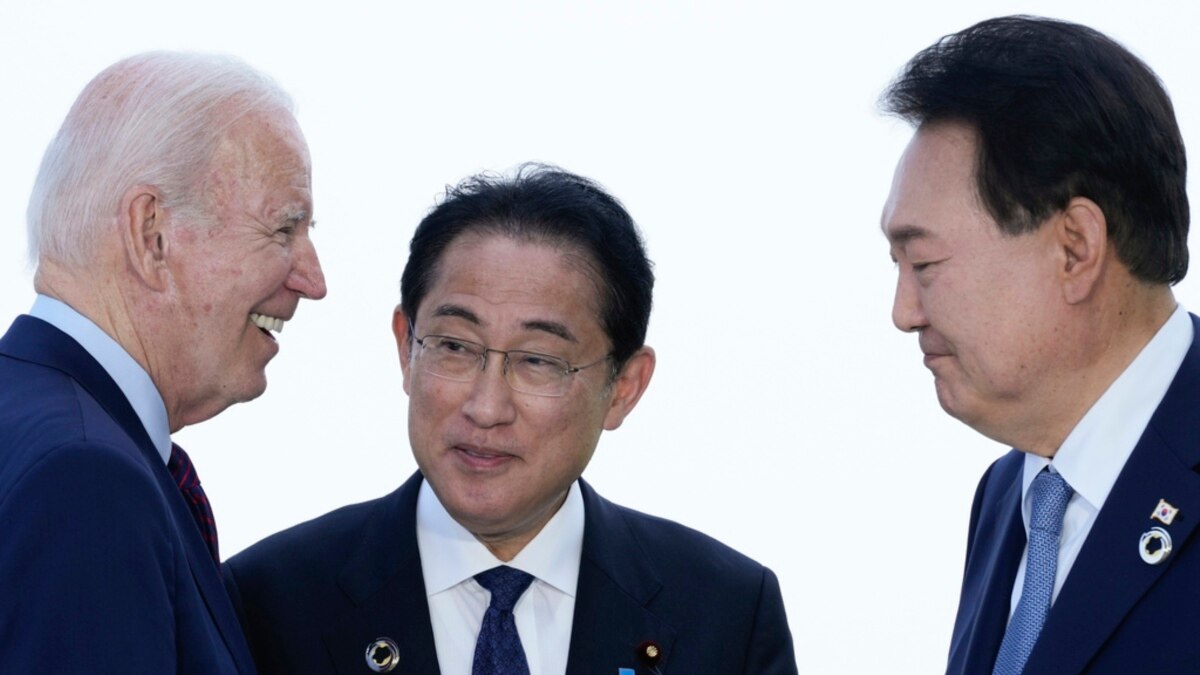US Expected to Expand South Korea and Japan Security Links at Summit

The United States, South Korea and Japan are expected to establish an enduring tripartite security regime in defense of the Indo-Pacific region — a move China opposes as antagonistic — at their first trilateral summit, said experts.
The gathering of the three countries planned for Friday at Camp David, the U.S. presidential retreat in Maryland, will be an occasion for the U.S. to fuse its two treaty alliances into a tighter security network and expand their roles in the region, experts said.
At the end of the summit, U.S. President Joe Biden, South Korean President Yoon Suk Yeol and Japanese Prime Minister Fumio Kishida are expected to announce plans to hold regular meetings and take measures to bolster security cooperation beyond deterring North Korean threats.
Evans Revere, who served as the acting assistant secretary of state for East Asia and Pacific Affairs during the George W. Bush administration, said a joint statement by the three leaders is likely to reflect these plans.
“The statement will make clear that North Korea is not the only concern that has brought them together for this unprecedented trilateral gathering at Camp David,” Revere said.
“While Pyongyang may be the most urgent threat, the PRC is undoubtedly the biggest strategic challenge facing Washington, Tokyo, and Seoul over the long term,” he said.
China’s official name is the People’s Republic of China.
“The agreements reached at this historic summit will move the three countries closer to a permanent partnership that focuses on intelligence and information sharing, missile defense, joint military exercises, cybersecurity, early warning cooperation, and enhanced nuclear deterrence,” said Revere.
Building a partnership
Merging the efforts by South Korea and Japan into an ongoing partnership has long been a goal for the U.S. It is possible now because the leaders of the two countries mended frayed ties in March. Antagonisms rooted in the Japanese colonization of the Korean Peninsula from 1910-45 had hampered close cooperation between the two East Asian nations, especially on military matters.
The U.S., South Korea and Japan conducted joint ballistic missile drills in October, February, April and July in response to North Korea’s missile launches.
Traditionally, South Korea has focused on deterring North Korean threats while Japan has been involved in defending against China’s claim to the Japanese-administered Senkaku Islands in the East China Sea, referred to as the Diaoyu in Chinese.
Now, Seoul and Tokyo are expected to consolidate their efforts against threats from their two autocratic neighbors.
Yoon emphasized in his National Liberation Day speech delivered on Tuesday that Japan’s role is critical in defending against a North Korean attack. He said seven rear Japanese bases will provide land, sea and air capabilities for the U.S.-led U.N. Command stationed in South Korea if fighting breaks out on the peninsula.
Yoon added that the summit will set “a new milestone in trilateral cooperation” and that boosting cooperation with NATO is also important as security in the Indo-Pacific is closely connected to the security of Europe.
Tightening trilateral ties
South Korea’s defense against North Korea has been supported by the U.S.-led U.N. Command, composed of multilateral forces stationed in the country. Japan’s defense against China has been propped up by its membership in the QUAD security dialogue, whose other members are the U.S., Australia and India.
“The three countries’ national security and defense strategies are already closely aligned,” said Daniel Russel, who served as the assistant U.S. secretary of state for East Asia and Pacific Affairs in the Obama administration. “All three leaders are deeply concerned by the risks posed by increasingly assertive Chinese military behavior and are sure to discuss practical ways to bolster deterrence and reduce the risk of an incident.”
At a press conference on Tuesday after a virtual meeting with his South Korean and Japanese counterparts, Secretary of State Antony Blinken said the trilateral collaboration will be expanded and “further institutionalized” through regular meetings at senior levels.
Terence Roehrig, a professor of national security and Korea expert at the U.S. Naval War College, said institutionalizing trilateral dialogue is an important goal of this summit so that the ties “can withstand any further turmoil in relations between Japan and South Korea.”
China considers summit antagonistic
State Department spokesperson Vedant Patel said at a press briefing on Tuesday that the summit is not meant to be “provocative” or “to incite tensions” with China. Nevertheless, Beijing views it as antagonistic.
Chinese Embassy spokesperson Liu Pengyu told VOA’s Korean Service via email on Tuesday that “China has noticed that exclusionary groupings are being assembled for the so-called ‘regional security,’ only to intensify antagonism and undermine the strategic security of other countries.”
He continued, “China firmly opposes such practices.”
Chinese Defense Minister Li Shangfu and Russian Defense Minister Sergei Shoigu agreed on closer military cooperation when they met at the Moscow Conference on International Security on Tuesday.
Li has been under U.S. sanctions since 2018.
Moscow has leaned on Pyongyang for arms support to fight in its war against Ukraine. The U.S. Treasury on Wednesday sanctioned entities involved in arms deals between Russia and North Korea.
Andrew Yeo, the SK-Korea Foundation chair in Korea Studies at the Brookings Institution, said the Washington-Seoul-Tokyo ties “along with other initiatives like the QUAD or AUKUS, should clearly signal” to the China-North Korea-Russian partnership “that their decision to undermine international norms and rules will only strengthen partnership among U.S. allies.”
https://www.voanews.com/a/us-expected-to-expand-south-korea-and-japan-security-links-at-summit/7228615.html US Expected to Expand South Korea and Japan Security Links at Summit



